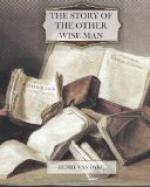His robe was of pure white wool, thrown over a tunic of silk; and a white, pointed cap, with long lapels at the sides, rested on his flowing black hair. It was the dress of the ancient priesthood of the Magi, called the fire-worshippers.
“Welcome!” he said, in his low, pleasant voice, as one after another entered the room—“welcome, Abdus; peace be with you, Rhodaspes and Tigranes, and with you my father, Abgarus. You are all welcome, and this house grows bright with the joy of your presence.”
There were nine of the men, differing widely in age, but alike in the richness of their dress of many-coloured silks, and in the massive golden collars around their necks, marking them as Parthian nobles, and in the winged circles of gold resting upon their breasts, the sign of the followers of Zoroaster.
They took their places around a small black altar at the end of the room, where a tiny flame was burning. Artaban, standing beside it, and waving a barsom of thin tamarisk branches above the fire, fed it with dry sticks of pine and fragrant oils. Then he began the ancient chant of the Yasna, and the voices of his companions joined in the beautiful hymn to Ahura-Mazda:
We worship the Spirit Divine,
all wisdom and goodness possessing,
Surrounded by Holy Immortals,
the givers of bounty and blessing.
We joy in the works of His hands,
His truth and His power confessing.
We praise all the things that are pure,
for these are His only Creation;
The thoughts that are true, and the words
and deeds that have won approbation;
These are supported by Him,
and for these we make adoration.
Hear us, O Mazda! Thou livest
in truth and in heavenly gladness;
Cleanse us from falsehood, and keep us
from evil and bondage to badness;
Pour out the light and the joy of Thy life
on our darkness and sadness.
Shine on our gardens and fields,
Shine on our working and weaving;
Shine on the whole race of man,
Believing and unbelieving;
Shine on us now through the
night,
Shine on us now in Thy might,
The flame of our holy love
and the song of our worship
receiving.
The fire rose with the chant, throbbing as if it were made of musical flame, until it cast a bright illumination through the whole apartment, revealing its simplicity and splendour.
The floor was laid with tiles of dark blue veined with white; pilasters of twisted silver stood out against the blue walls; the clearstory of round-arched windows above them was hung with azure silk; the vaulted ceiling was a pavement of sapphires, like the body of heaven in its clearness, sown with silver stars. From the four corners of the roof hung four golden magic-wheels, called the tongues of the gods. At the eastern end, behind the altar, there were two dark-red pillars of porphyry; above them a lintel of the same stone, on which was carved the figure of a winged archer, with his arrow set to the string and his bow drawn.




